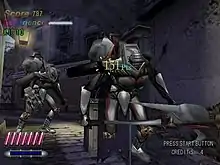| Death Crimson OX | |
|---|---|
 | |
| Developer(s) | Ecole Software |
| Publisher(s) | |
| Producer(s) | Yoshiyuki Manabe |
| Designer(s) | Shinya Sawada |
| Programmer(s) | Takaaki Umezu |
| Artist(s) | Sachiko Akasaka |
| Writer(s) | Manako Ihaya |
| Composer(s) | Masafumi Ogata Kaoru Mizuki Yūki Kisaragi |
| Platform(s) | Arcade, Dreamcast, PlayStation 2 |
| Release | |
| Genre(s) | Light gun shooter |
| Mode(s) | |
| Arcade system | Sega NAOMI |
Death Crimson OX[lower-alpha 1] is a light gun shooting game developed by Ecole Software. It was released in arcades in 2000 then ported to the Dreamcast console in 2001 (published by Sammy Entertainment), several months after Sega had dropped support for the console. It is the third game in the Death Crimson series, and the only one to be released outside Japan. The game was also released as Guncom 2 in Europe and Death Crimson OX+ (デスクリムゾン OX+, Desu Kurimuzon Okkusu+) in Japan on the PlayStation 2.
Gameplay

The game can be played with either a standard controller or a light gun.
Development
Reception
| Aggregator | Score |
|---|---|
| Metacritic | 46/100[6] |
| Publication | Score |
|---|---|
| Famitsu | 25/40[7] |
| Game Informer | 4/10[8] |
| GameSpot | 4.2/10[9] |
| GameSpy | 60%[10] |
| IGN | 4.3/10[11] |
| Next Generation | |
| Dreamcast Magazine (JP) | (DC) 6.33/10[13] |
The Dreamcast version received "generally unfavourable reviews" according to the review aggregation website Metacritic.[6] GameSpot described it as a second-rate House of the Dead clone.[9] IGN cited a confusing storyline, poor visuals, and new gameplay mechanics which prevent the game from offering any sort of challenge.[11] Game Informer said that it "gives you plenty of targets, but no real reason to keep pulling the trigger."[8] Eric Bratcher of NextGen called it "A typical gun game with typical gun game problems: It's too short, too redundant, and too similar to everything else out there. Only the NRA would lobby for this one."[12] In Japan, Famitsu gave it a score of 25 out of 40.[7]
Also in Japan, Game Machine listed the arcade version in their 1 January 2001 issue as the thirteenth most-popular dedicated arcade game of the year 2000.[14]
Notes
References
- ↑ Famitsu DC (15 February 2002). Chapter 5 - NAOMI & NAOMI 2 - デスクリムゾン オックス. Famitsu Books (in Japanese). Enterbrain. p. 169. ISBN 9784757707900.
{{cite book}}:|work=ignored (help) - ↑ Akagi, Masumi (13 October 2006). エコールソフトウェア (Ecole Software); セガ社 (Sega) (in Japanese) (1st ed.). Amusement News Agency. pp. 18, 39. ISBN 978-4990251215.
{{cite book}}:|work=ignored (help) - ↑ "NAOMI: Death Crimson OX". Dreamcast Magazine (in Japanese). No. 91. SoftBank Creative. 10 November 2000. pp. 150–51.
- ↑ "Death Crimson OX". Monthly Arcadia. No. 8. Enterbrain. January 2001. pp. 58–59.
- ↑ "Death Crimson OX". Dreamcast Magazine (in Japanese). No. 109. SoftBank Creative. 30 March 2001. pp. 54–55.
- 1 2 "Death Crimson OX for Dreamcast Reviews". Metacritic. Red Ventures. Retrieved 19 February 2021.
- 1 2 Sakai, Kata; Yatsuka, Arashi; Okumura, Kisuko; Haneda, Takayuki (18 May 2001). "NEW GAME CROSS REVIEW: デスクリムゾンOX (ドリームキャスト)". Famitsu (in Japanese). No. 648. Enterbrain. p. 33. Retrieved 19 February 2021.
- 1 2 "Death Crimson OX". Game Informer. No. 104. FuncoLand. December 2001. p. 113.
- 1 2 Shoemaker, Brad (30 August 2001). "Death Crimson OX Review [date mislabeled as "May 17, 2006]". GameSpot. Red Ventures. Retrieved 28 June 2020.
- ↑ Ross, Max (17 August 2001). "Death Crimson OX (Dreamcast) - Grab your gun and help fight with the resistance". GameSpy. IGN Entertainment. Archived from the original on 14 March 2002. Retrieved 28 June 2020.
- 1 2 IGN staff (22 August 2001). "Death Crimson OX". IGN. Ziff Davis. Retrieved 28 June 2020.
- 1 2 Bratcher, Eric (December 2001). "Death Crimson OX (DC)". NextGen. No. 84. Imagine Media. p. 112. Retrieved 19 February 2021.
- ↑ "Weekly Dreamcast Soft Review - デスクリムゾンOX". Dreamcast Magazine (in Japanese). No. 114. SoftBank Creative. 11 May 2001. p. 19.
- ↑ "Game Machine's Best Hit Games 25 - 完成品夕イプのTVゲーム機 (Dedicated Videos)". Game Machine (in Japanese). No. 625. Amusement Press, Inc. 1 January 2001. p. 21.